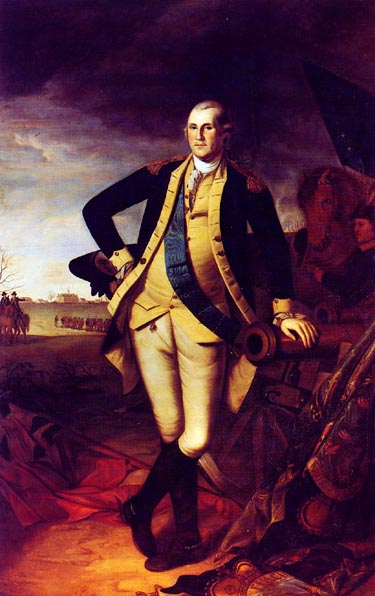George Washington
By Charles Willson Peale
Oil on canvas, 91
George Washington was born in Westmoreland County, Virginia, on 22 February 1732; was educated in the home by his father and older brother; was appointed county surveyor for Culpeper, 1749, and a district adjutant general in the Virginia militia, 1752; was detailed by Governor Dinwiddie of Virginia to carry a British ultimatum to the French on the Ohio frontier, 1753; was commissioned a lieutenant colonel and led an abortive expedition against the French at Fort Duquesne, 1754; was aide to General Edward Braddock on the ill-fated Monongahela expedition, 1755; was promoted to colonel and named commander of all Virginia forces, 1755; participated as a brigadier general in the Forbes expedition that prompted French evacuation of Fort Duquesne, and British establishment of Pittsburgh, 1758; was elected to the Virginia House of Burgesses, 1758; married Martha Dandridge Custis, 1759; was a justice of Fairfax and held court in Alexandria, Virginia, 1760–1774; served as a Virginia delegate to the First and Second Continental Congresses, 1774 and 1775; was appointed general and elected by Congress to be commander in chief of the Continental Army, June 1775; assumed command of the Continental Army in the field at Cambridge, Massachusetts, July 1775; served as commander in chief of the Continental Army, 15 June 1775–23 December 1783; commanded the field forces in significant Revolutionary War actions at Boston (March 1776), Trenton (December 1776), Princeton (January 1777), Brandywine (September 1777), Germantown (October 1777), Monmouth (June 1778), and Yorktown (October 1781); delivered his farewell address to his officers at Fraunces Tavern in New York City, December 1783; tendered his resignation as commander in chief, December 1783. (For details of Washington’s second term as commanding general and his later life see page 62.)
The Artist
Charles Willson Peale (1741–1827) was born in St. Paul’s
Parish, Queen Annes County, Maryland. He turned to portrait painting when
circumstances forced him to abandon his early trade of saddler, and studied
under John Hesselius in America and Benjamin West in England. A militia
officer in the Revolution, his miniature portraits of his fellow officers
became the nucleus of the Philadelphia Museum collection, and he was later
instrumental in the establishment of the Pennsylvania Academy of the Fine
Arts. Peale painted perhaps sixty portraits of George Washington, probably
seven from life. This contemporary standing portrait hangs in the Senate
wing of the renowned building that houses the United States Congress in
Washington, D.C., and is reproduced from the United States Capitol Collection.
George Washington
By Charles Willson Peale
Oil on canvas, 91![]() "
x 58
"
x 58![]() ",
1779
",
1779
[48]

page updated 30 April 2001